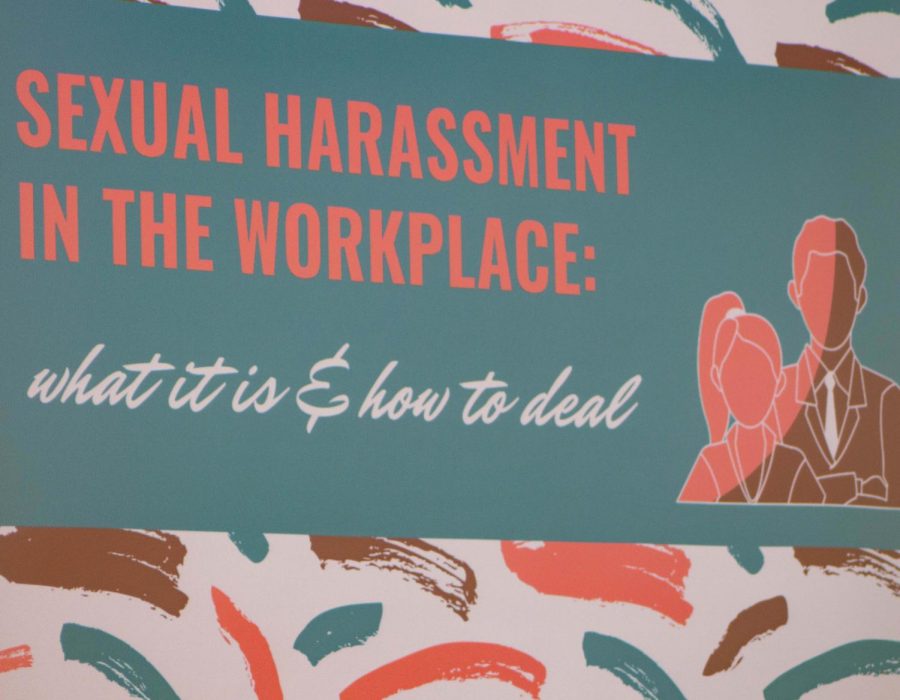Addressing workplace sexual harassment
Oct 3, 2019
On Tuesday, Oct. 1, Assistant Professor of Political Science Jayme Renfro collaborated with the Northern Iowa Feminists for a presentation on sexual harassment in the workplace. The presentation, which took place in the Oak Room of Maucker Union, covered what sexual harassment is, how to recognize it, and how to report it. Professor Renfro shared that sexual harassment is an important issue to her and hopes that her students can take what she teaches them with them into the workplace.
Renfro explained how sexual harassment is a civil offense defined by the Equal Opportunity Employer Commission as unwelcome sexual advances, requests for sexual favors, or other verbal and physical harassment of sexual, sex, or gender-based nature. Sexual harassment, can be legally pursued when it occurs in the workplace or a school setting.
Sexual harassment generally doesn’t include teasing, one-time comments or asking someone out, as these are things that don’t happen regularly, said Renfro. When unwanted behaviors start to become recurrent, that is when it is considered sexual harassment.
Renfro said sexual harassment can happen to anyone.
“Sexual harassment is not only a male-on-female phenomenon. It’s also not only a boss-on-subordinate phenomenon. You can definitely harness somebody who has more power than you,” Renfro said. “There’s all kinds of different examples, anything from requesting sexual favors or telling somebody that their employment is conditional. There’s also creating a hostile work environment, by telling really inappropriate sexual jokes regularly and commenting on someone’s appearance over and over. It can go all the way to exposing yourself or physically touching someone.”
According to Renfro, sexual harassment became a greater issue approximately 50 years ago, when women first entered the workforce. In the 1970s, there was a stagnation of wages and an increase in prices. To make up the difference, men took second jobs and worked longer hours, and women began to work as well. This suddenly created a different and unfamiliar working environment for men, according to Renfro, and it soon created a hostile working environment for women. Protections for women and minorities were put into place by the Equal Opportunity Employment Commission, stating that women have a right to work.
Renfro’s presentation also addressed sexual harassment in schools, specifically universities. Universities have a Title IX office, which deals with reports of sexual harassment and helps find resolutions to the problem.
During the presentation, student questions centered on the exact definition of sexual harassment, and whether the victim has to tell someone for an incident to qualify as “sexual harassment.”
Renfro explained that there are some gray areas to sexual harassment. If you don’t report it, it isn’t legally considered sexual harassment. Therefore, she urged audience members to report persistent unwanted attention.
Renfro said that while society has come a long way since the 1970s, recent years have seen setbacks and less attention devoted to problems like sexual harassment, something she hopes will change in the future.
Sierra Nemmers, a freshman communications major who attended the presentation, said, “I thought it sounded like a really interesting topic, and it’s always great to educate ourselves with new information.”
Leanna Sooths, a freshman music education major, said she came to the presentation because it sounded like an engrossing topic that isn’t discussed enough. Both said they left the presentation with lots of new information.
“I never realized how many forms sexual harassment can come in,” Nemmers said. “Even something that may seem small and subtle can be sexual harassment.”
Sooths said she now knows more information about sexual harassment in schools.
“Knowing how helpful Title IX is is really cool. This is a subject that isn’t talked about a lot but should be,” she said.














